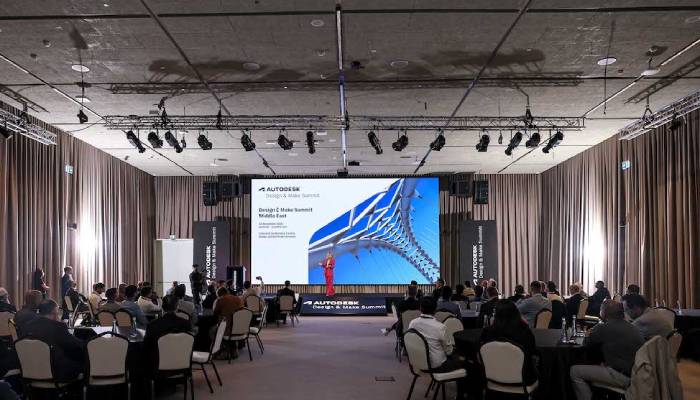Autodesk recently hosted its Design and Make Summit in Dubai, highlighting the powerful role of digital transformation and AI in shaping the future of business resilience, talent development, and sustainability across the Middle East. With AI’s rapid global adoption, Autodesk gathered leaders from the architecture, engineering, construction, and operations (AECO) sector to explore new growth opportunities driven by AI and interconnected data.
Nicholas Mangon, VP of AEC at Autodesk “At Autodesk, we don’t see technology as a disruptive force but as a driver of cohesion and resilience.
Autodesk’s AI-Driven Design and Make Platform Empowers Regional Industries
As AI becomes essential for competitiveness, Autodesk’s recent State of Design and Make Report revealed that 84 percent of respondents view AI as transformative for their industry, with 87 percent expressing a positive outlook toward its potential. This enthusiasm reflects the growing adoption of AI solutions across industries, with many companies in the Middle East actively exploring how Autodesk AI can support their business objectives and enhance efficiency. Autodesk AI augments creative exploration and problem-solving; automates repetitive tasks to minimize errors and free up time; and analyzes complex project data to offer predictive insights.
“We’re committed to accelerating AI adoption in the Middle East to help business leaders make strategic decisions and prioritize for the future, particularly when it comes to sustainable development and optimizing current processes and approaches” said Naji Atallah, Head of Construction and Manufacturing, EMEA Emerging at Autodesk. “Autodesk’s vision centers around interconnected data, enabling AI to support customers’ processes seamlessly and to realize their full potential.”
Naji Atallah, Head of Construction and Manufacturing, EMEA Emerging at Autodesk “Autodesk’s vision centers around interconnected data, enabling AI to support customers’ processes seamlessly and to realize their full potential.”
Autodesk has long pioneered innovations across the design and make process, enabling Middle East’s designers to leverage AI to more effectively and better monitor project lifecycle, performance, and predict outcomes. At the summit, prominent voices from the region shared insights into using AI and robotics in architecture and manufacturing.
“AI is now evolving as a collaborative tool, assisting teams throughout the entire project lifecycle. The importance of starting today in identifying the high impact use-cases for AI, that will define your AI strategy as a project stakeholder, has never been more significant than it is now” noted Toufic Riman, Country Manager at Autodesk, highlighting the transformative nature of AI beyond traditional applications.
Showcasing Real-World Impact and AI Adoption across Industries
The Design and Make Summit offered focused sessions across AECO and developer ecosystems, underscoring the rapid advancements Autodesk brings to the Middle East’s digital landscape. Local industry leaders shared experiences in navigating evolving talent needs and market demands through Autodesk’s advanced solutions. Speakers included companies such as KEO International Consultants, Modon Real Estate, and Zutari, covering innovation and technology, as well as a graduate architect from Heriot Watt University and educator from professor and Dean from the school of architecture at Ajman University, discussing the future of work.
Nicholas Mangon, VP of AEC at Autodesk commented following his attendance at the event: “At Autodesk, we don’t see technology as a disruptive force but as a driver of cohesion and resilience. Through outcome-based BIM, we’re tackling the industry’s current challenges — from resource shortages and the complexities of mega projects to the underutilization of data. By embedding AI capabilities across our platforms, we’re enabling co-creation between humans and AI. The goal is to drive productivity across the lifecycle of projects, reusing knowledge from prior efforts, enhancing hybrid workflows, and empowering data to meet real-world demands. Outcome-based BIM is about fostering a smarter, more connected way of building for the future.”


